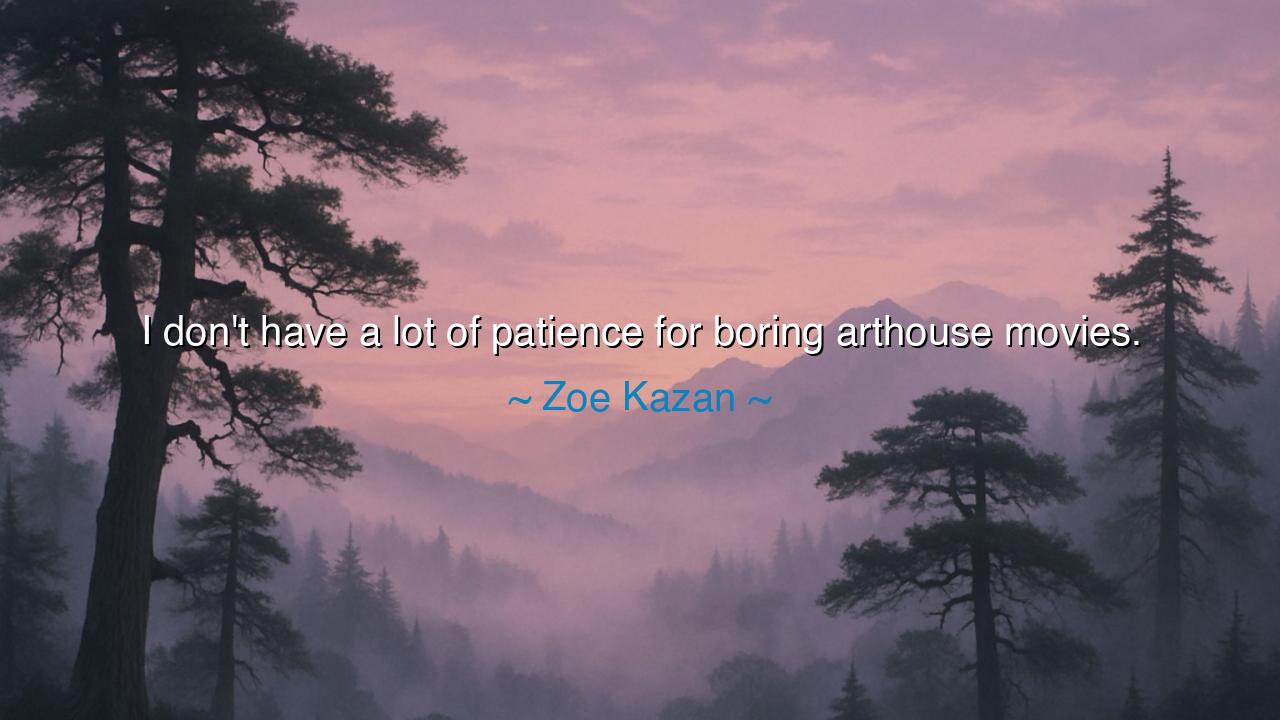
I don't have a lot of patience for boring arthouse movies.






Hear, O listeners, the candid words of Zoe Kazan, who declared: “I don’t have a lot of patience for boring arthouse movies.” Though they may seem at first light, they reveal a truth that stretches far beyond cinema, into the very heart of how we consume stories and seek meaning. For in her words we see the struggle between art that alienates and art that connects, between self-indulgence and shared experience, between works that demand endurance without reward and those that stir the soul with fire.
In every age, there have been storytellers who drift toward obscurity, creating works that serve only themselves, cloaked in abstraction and detachment. These are the arthouse works Kazan rejects—not because they are “art,” but because they fail to breathe life into the heart of the viewer. To sit before them requires patience, and patience is a noble virtue, but patience without nourishment is wasted. For what is the purpose of art if not to awaken, to inspire, to speak? If it bores, if it alienates, then it has lost its power.
Consider, O seekers of wisdom, the plays of ancient Greece. Sophocles and Euripides wrote of kings, gods, and tragedies, yet their works endured not because they were obscure, but because they touched the anguish and longing of the human heart. They were profound without being inaccessible, deep without being dull. Their genius lay in making the eternal struggles of mankind visible to all—peasants and philosophers alike. This is the standard Kazan’s words call us back to: that art must live, must breathe, must be more than an exercise in indulgence.
So too in history do we see the failure of works that sought only to impress with complexity. During the late Roman Empire, the orators became enamored with their own cleverness, speaking in endless flourishes, weaving tangled phrases that delighted none but themselves. The people ceased to listen, the words ceased to matter, and Rome herself descended into silence. The lesson is clear: art that is boring, however intricate, becomes barren. The audience departs, and the message withers.
The meaning of Kazan’s words is not to dismiss the bold or the experimental, but to remind us that art must remain tethered to humanity. Movies, like plays or songs, must hold the heart, must feed the spirit. The artist must not scorn the audience, but embrace them—not by pandering, but by crafting works that speak truly. When art grows so obscure that it alienates the very people it should reach, it becomes vanity, and the audience is right to withhold their patience.
The lesson for us all, then, is this: do not waste your endurance on things that do not enrich you. Life is short, and time is precious. If a work—whether art, writing, or task—does not challenge, inspire, or nourish, then it is better to turn your energy to something worthy. Patience is a sacred gift, but it must be invested wisely, not squandered on emptiness.
Practical steps follow. As a creator, strive to make your work alive, to connect, to inspire, to move. Do not hide behind obscurity, but seek clarity that uplifts. As a viewer, as a listener, as a reader, choose carefully what you give your time to. If something leaves you empty, let it pass. Seek what fills your spirit with fire and awakens your imagination. For in these choices lies the shaping of your soul.
Therefore, O children of tomorrow, remember Zoe Kazan’s words. Let your patience be guarded, let your love of art be discerning. Do not mistake boredom for depth, nor obscurity for greatness. Seek always the works that breathe life into your heart, and create always with the intent to awaken others. In this way, your time will be well spent, your spirit well fed, and your own creations will shine as torches in the dark.






AAdministratorAdministrator
Welcome, honored guests. Please leave a comment, we will respond soon